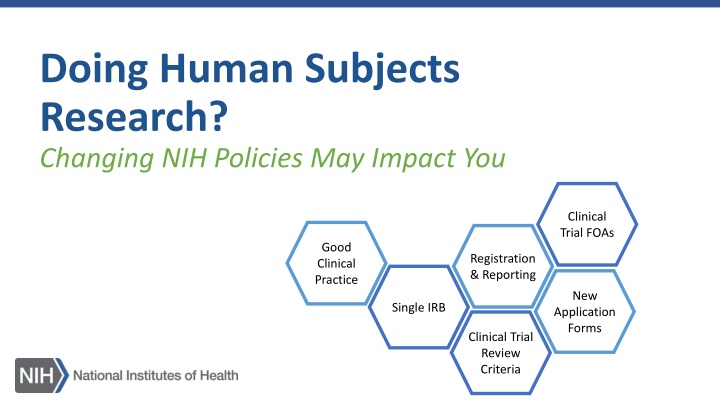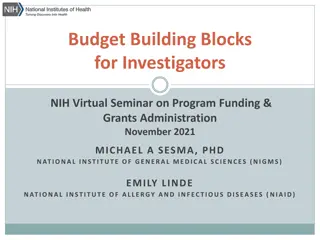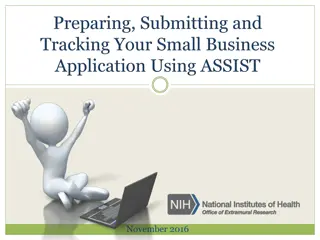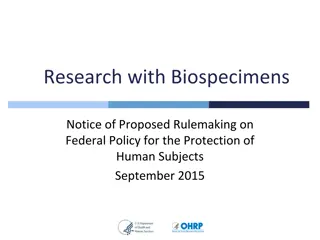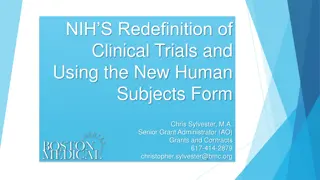NIH Policy Changes Impacting Human Subjects Research
Changes in NIH policies are aimed at enhancing efficiency, transparency, and accountability in research involving human participants. Reforms include new forms, training in Good Clinical Practice, and single IRB use for multi-site studies.
Download Presentation

Please find below an Image/Link to download the presentation.
The content on the website is provided AS IS for your information and personal use only. It may not be sold, licensed, or shared on other websites without obtaining consent from the author.If you encounter any issues during the download, it is possible that the publisher has removed the file from their server.
You are allowed to download the files provided on this website for personal or commercial use, subject to the condition that they are used lawfully. All files are the property of their respective owners.
The content on the website is provided AS IS for your information and personal use only. It may not be sold, licensed, or shared on other websites without obtaining consent from the author.
E N D
Presentation Transcript
Doing Human Subjects Research? Changing NIH Policies May Impact You Clinical Trial FOAs Good Clinical Practice Registration & Reporting New Single IRB Application Forms Clinical Trial Review Criteria
Purpose of Reforms & Policy Changes In 2016, NIH announced initiatives targeted to enhance and improve: Efficiency Transparency Enhance the efficiency of how research studies involving human participants are conducted Promote a culture of transparency in research in order to advance public health Accountability Timely Reporting Ensure that NIH can appropriately identify and report on their clinical trials portfolio to ensure proper stewardship Decrease the time it takes investigators to publicly report study results
Reforms & Initiatives To enhance the stewardship of research involving human subjects, NIH is implementing the following: All Research Involving Human Participants Research that Meets the NIH Definition of a Clinical Trial New forms to collect human subjects information Training in Good Clinical Practice (GCP) Clinical trial-specific Funding Opportunity Announcements (FOAs) Use of a single Institutional Review Board (IRB) for multi-site studies New review criteria Expanded registration and results reporting in ClinicalTrials.gov
How Does NIH Define a Clinical Trial? A research study in which one or more human subjects are prospectively assigned to one or more interventions (which may include placebo or other control) to evaluate the effects of those interventions on health-related biomedical or behavioral outcomes. Learn more at https://grants.nih.gov/policy/clinical-trials/definition.htm
Unpacking the Definition (Part I) Prospectively Assigned: a pre-defined process (e.g., randomization) specified in an approved protocol that stipulates the assignment of research subjects (individually or in clusters) to one or more arms (e.g., intervention, placebo, or other control) of a clinical trial. Intervention: a manipulation of the subject or subject s environment for the purpose of modifying one or more health-related biomedical or behavioral processes and/or endpoints. Examples include: drugs/small molecules/compounds, biologics, devices procedures (e.g., surgical techniques); delivery systems (e.g., telemedicine, face-to-face interviews) strategies to change health-related behavior (e.g., diet, cognitive therapy, exercise, development of new habits) treatment strategies, prevention strategies, and diagnostic strategies
Unpacking the Definition (Part II) Health-related Biomedical or Behavioral Outcome: the pre-specified goal(s) or condition(s) that reflect the effect of one or more interventions on human subjects biomedical or behavioral status or quality of life. Examples include: positive or negative changes to physiological or biological parameters (e.g., improvement of lung capacity, gene expression) positive or negative changes to psychological or neurodevelopmental parameters (e.g., mood management intervention for smokers, reading comprehension and/or information retention) positive or negative changes to disease processes positive or negative changes to health-related behaviors positive or negative changes to quality of life
NIH Definition of a Clinical Trial is Broad Definition was clarified and broadened in October 2014 Encompasses a wide range of types of trials, including: Mechanistic Exploratory Pilot/Feasibility Behavioral With broader definition, many more studies are classified as clinical trials
Questions to Ask Yourself Does your study Involve one or more human subjects? If yes to ALL of these questions, your study is considered a clinical trial Involve one or more interventions? Prospectively assign human subject(s) to intervention(s)? Have a health-related biomedical or behavioral outcome?
Activities that are NOT Considered to be a Clinical Trial The following activities are NOT considered clinical trials by NIH: Surveys Questionnaires User preferences Focus groups Secondary research with biospecimens or health information
Why is it important to know if you are doing a clinical trial? Knowing if your research meets the NIH definition of a clinical trial impacts how you: Select a funding opportunity announcement (FOA) Write the Research Strategy and human subjects sections of your application Comply with appropriate policies and regulations
Additional Information & Resources Refer to the following resources for help determining if your study is a clinical trial: Decision Tool Case Studies FAQs Decision Tree When in doubt, contact your Program Official Learn more at: https://grants.nih.gov/policy/clinical-trials/definition.htm
Clinical Trial Reforms & Initiatives Clinical Trial FOAs Good Clinical Practice Registration & Reporting New Single IRB Application Forms Clinical Trial Review Criteria
Good Clinical Practice Training Requirement Effective January 1, 2017 NIH expects all NIH-funded clinical investigators and clinical trial staff who are involved in the design, conduct, oversight, or management of clinical trials to be trained in Good Clinical Practice (GCP) Good Clinical Practice training establishes: Standards for clinical trial implementation, data collection, monitoring, and reporting Responsibilities of investigators, sponsors, monitors, and institutional review boards
Expectations for GCP Training GCP training can be achieved through several ways: class or course academic training program certification from a recognized clinical research professional organization Training should be refreshed every 3 years to stay up to date with regulations, standards, and guidelines Recipients of GCP training are expected to retain documentation of their training and make it available to NIH upon request Learn more at https://grants.nih.gov/policy/clinical-trials/good-clinical- training.htm
Funding Opportunity Announcements (FOAs) for Clinical Trials Effective for due dates on/after January 25, 2018 All grant applications & contract proposals involving one or more clinical trials must be submitted through an FOA or Request for Proposal (RFP) specifically designated for clinical trials Clinical Trial-specific FOAs allow NIH to: identify proposed clinical trials ensure that key pieces of clinical trial-specific information are submitted with each application uniformly apply clinical trial-specific review criteria Important: Adding a clinical trial to a non-clinical trial application is no longer permitted via the prior approval process. Grantees must submit competitive renewal.
How to Determine if an FOA Accepts Clinical Trials? FOA Title (new FOAs only) FOA Section II. Award Information Tip: Check your FOA at least 30 days before the due date for any updates
Clinical Trial Designations for FOAs Effective for due dates on/after January 25, 2018 all FOAs will be designated as one of the following in Section II of the FOA: Clinical Trial Required Clinical Trial Not Allowed Clinical Trial Optional No Independent Clinical Trials: *only for Career Development (K) & Fellowship (F) Tip: Contact your Program Official or the Scientific/Research contact listed in Section VII of the FOA to ensure you are submitting to the correct announcement
Special Considerations for Training, Fellowship, and Career Development FOAs Training (T) awards: Institutional Training awards do not support clinical trials (with the exception of some D43 and K12 awards) Fellowship (F) awards: The NIH encourages fellows to receive training in clinical research; however, NIH supported fellows are not permitted to conduct a clinical trial independently Career Development (K) awards: Career Development awards may support either independent clinical trials or a mentored research training experience, depending on the FOA Learn more at https://grants.nih.gov/policy/clinical-trials/specific- funding-opportunities.htm
Review Criteria for Clinical Trials FOAs that accept clinical trials will include new review criteria Scored Review Criteria Significance Investigator Innovation Approach Environment Tip: Read the FOA carefully and be sure your application addresses the review criteria appropriately Additional Review Criteria Study Timeline & Milestones
New Human Subjects & Clinical Trials Information Form A primary component of NIH s clinical trial reform is the creation of a new application form that: Consolidates human subjects, inclusion enrollment, and clinical trial information into one form Collects information at the study-level Uses discrete form fields to capture clinical trial information and provide the level of detail needed for peer review Presents key information to reviewers and staff in a consistent format Aligns with ClinicalTrials.gov (where possible) for future data exchange with ClinicalTrials.gov
How Does the Human Subjects & Clinical Trials Information Form Impact Applicants? New form collects information previously included in the Research Strategy Applicants will now be instructed to: Use the PHS Human Subjects and Clinical Trials Information form to capture detailed study information Use the Research Strategy section to discuss the overall strategy, methodology, and analyses of proposed research, but do not duplicate information collected in the PHS Human Subjects and Clinical Trials Information form Tip: Applicants should familiarize themselves with the new Human Subjects and Clinical Trial Information form to ensure information is captured appropriately in the application
Changes to the Appendix Policy Effective for due dates on/after January 25, 2018 Since the new Human Subjects and Clinical Trials Information form collects key elements from the protocol, the optional protocol submission will be removed from the Appendix Policy. Parent FOAs Will NOT allow inclusion of the protocol in the application IC issued FOAs Protocols and other materials allowed only when specified as required in the FOA If the protocol is included, the application will be sent back Learn more at https://grants.nih.gov/grants/guide/notice-files/NOT-OD- 17-098.html
Key Dates for the Human Subjects & Clinical Trials Information Form September 25, 2017 New FORMS-E Application Instructions available October 25, 2017 FORMS-E Application Packages will start being published for FOAs with due dates on/after January 25, 2018 January 25, 2018 First due dates for new FORMS-E Application Packages Tip: During the transition period from FORMS-D to FORMS-E, both form packages will be available for some FOAs. It is important that applicants pay close attention and choose the announcement specific for their due date.
Resources for the Human Subjects & Clinical Trials Information Form Explore the new Annotated Form Set for FORMS-E Take a video tour of the new Human Subjects and Clinical Trial Information form Video tour of new form A picture with a link to a video tour of the new form. Learn more at https://grants.nih.gov/policy/clinical-trials/new-human- subject-clinical-trial-info-form.htm
Single Institutional Review Board (sIRB) Policy for Multi-site Research Effective for due dates on/after January 25, 2018 NIH expects that all multi-site studies, which involve non-exempt human subjects research funded by the NIH, will use a single Institutional Review Board (sIRB) to conduct the ethical review required for the protection of human subjects sIRB policy aims to: Streamline IRB review process to enhance research efficiency Reduce unnecessary administrative burdens and inefficiencies Learn more at https://grants.nih.gov/policy/clinical-trials/single-irb- policy-multi-site-research.htm
What Does the sIRB Policy Apply To? Domestic sites of NIH-funded multi-site studies where each site will conduct the same protocol involving non-exempt human subjects research Includes research supported through: Grants Cooperative agreements Contracts NIH Intramural Research Program sIRB policy does not apply to career development, research training, or fellowship awards
sIRB Plan for Applicants/Offerors Application/proposal must include a plan that: Describes the use of an sIRB that will be selected to serve as the IRB of record for all study sites Confirms that participating sites will adhere to the sIRB Policy and describes how communications between sites and sIRB will be handled Tip: sIRB Plan attachment will be included in the new Human Subjects & Clinical Trials Information form
NIH Policy on Dissemination of NIH-Funded Clinical Trial Information Effective for applications due on/after January 18, 2017 All clinical trial applications requesting support for a trial that will be initiated on/after January 18, 2017 must register and report the results in ClinicalTrials.gov NIH dissemination policy: Extends previous HHS laws and regulations to apply to all NIH-funded clinical trials, including the defined subset of applicable clinical trials Increases the availability of information to the public about clinical trials Learn more at https://grants.nih.gov/policy/clinical- trials/reporting/index.htm
Registering & Reporting Requirements for ClinicalTrials.gov In order to comply with the NIH Policy on Clinical Trial Dissemination, awardees must: Submit a plan in the application that outlines compliance with the expectations of the policy Register the clinical trial no later than 21 days after enrolling the first participant Submit summary results no later than one year after primary completion date
More Information on Registering & Reporting in ClinicalTrials.gov Decision tree for ensuring compliance FAQs Learn more at https://grants.nih.gov/policy/clinical-trials/reporting/index.htm
Resources Website on Clinical Trial Requirements for Grants and Contracts: https://grants.nih.gov/policy/clinical-trials.htm Training Resources: https://grants.nih.gov/policy/clinical-trials/training-resources.htm Slides Human Subjects/Clinical Trials Questionnaire Videos Training opportunities Help spread the word!
